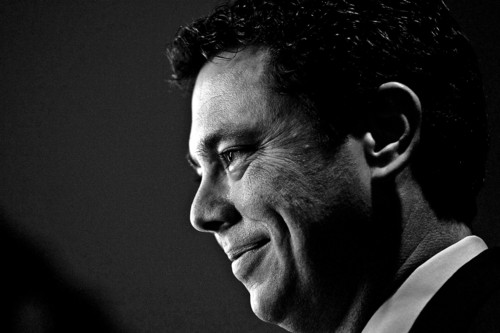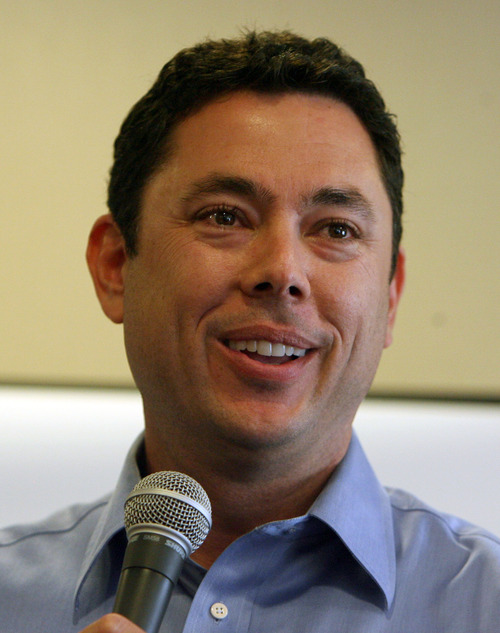This is an archived article that was published on sltrib.com in 2013, and information in the article may be outdated. It is provided only for personal research purposes and may not be reprinted.
Rep. Jason Chaffetz is making a return trip to the border this week, just days before negotiators in Congress are expected to unveil immigration reform plans.
Starting Tuesday, he'll spend three days in southern Arizona comparing the operations of the U.S. Border Patrol in Yuma and Nogales.
"As the immigration debate heats up, one of the key metrics is securing the border, and I think everybody on both sides of the aisle agreed that was pivotal," he told The Salt Lake Tribune on Monday. "The most important thing for me is to talk to the people who are actually out there doing it."
Chaffetz, R-Utah, leads an oversight subcommittee focused on national security, and he's planning hearings on border security in May. He's also a member of the Judiciary Committee, which will debate immigration reform, and the Homeland Security Committee, which oversees border agents.
His visit comes a week after four senators who are part of a team negotiating a broad immigration reform bill visited Nogales. The group, led by Sen. Chuck Schumer, D-N.Y., and Sen. John McCain, R-Ariz., observed the border by air and by ground and spotted a woman scaling an 18-foot-tall border fence before she was detained by border agents.
"You can read and you can study and you can talk but until you see things it doesn't become reality," Schumer said, according to The Associated Press. "Many of my colleagues say, 'Why do we need to do anything more on the border?' and we do. We should do more."
Schumer said the Border Patrol has enough agents, but may need some new technology, a comment echoed by Homeland Security Secretary Janet Napolitano at a reporters breakfast hosted by the Christian Science Monitor last week. Napolitano said she has provided Congress with a sector-by-sector list of equipment needs, while also noting that the entire Southwest border is now patrolled by drones.
"We are confident that the border is as secure as it has ever been," she said.
That is a claim that irritates Chaffetz, because the federal government hasn't been able to back it up statistically. Border agents are apprehending fewer people trying to cross the border, but the congressman said he doesn't know if that means the border is more secure or less secure.
"How do you tell?" Chaffetz asked. "We've had a very depressed economy. That probably has more to do with it than our ability to gain operational control of our border."
He visited the border in 2011 and he wants to go back to see if the situation has improved. Along with Rep. Kerry Bentivolio, R-Mich., Chaffetz will go out with agents on night patrols and observe the operation of ports of entry. He'll also spend some time Wednesday with Joel Ivie, a Border Patrol agent originally from Provo. Ivie's brother Nicholas was also in the Border Patrol. He died in a friendly fire incident in Arizona last year.
Chaffetz wants to ask border agents what they think it will take to get "operational control" over the border, and he wants to compare the way agents in Nogales immediately send immigrants caught back into Mexico, while Tucson agents often detain border crossers for as long as two weeks.
Napolitano says her department has struggled to find one statistic that adequately describes life on the border. She said it should include apprehension rates, but also property values, crime rates and other statistics. So far they have come up empty.
"There is no one number that captures that," she said.
Napolitano encourages members of Congress to reform the visa system if they want to reduce pressure on the border, including rules that ban a deported immigrant from applying to enter the United States for 10 years.
On that topic, Chaffetz is in full agreement.
"I have always argued that until you fix legal immigration, you will never ever solve the problem with the border," he said.
But Chaffetz is not a fan of plans being developed in the House and Senate, which lump all of the immigration issues from border security to legal status for undocumented immigrants into one bill. He has opposed any pathway to citizenship for immigrants here illegally, and he expects a large immigration bill will become too politically toxic to make it through Congress. A similar attempt at comprehensive immigration reform failed in 2007. Chaffetz prefers advancing smaller bills on consensus items, such as border security, a move advocates argue is a way for conservatives to avoid providing legal status to undocumented immigrants.
"If this fails, it'll be another eight years before it is brought up again," Chaffetz said. "That is sad."
Twitter: @mattcanham





